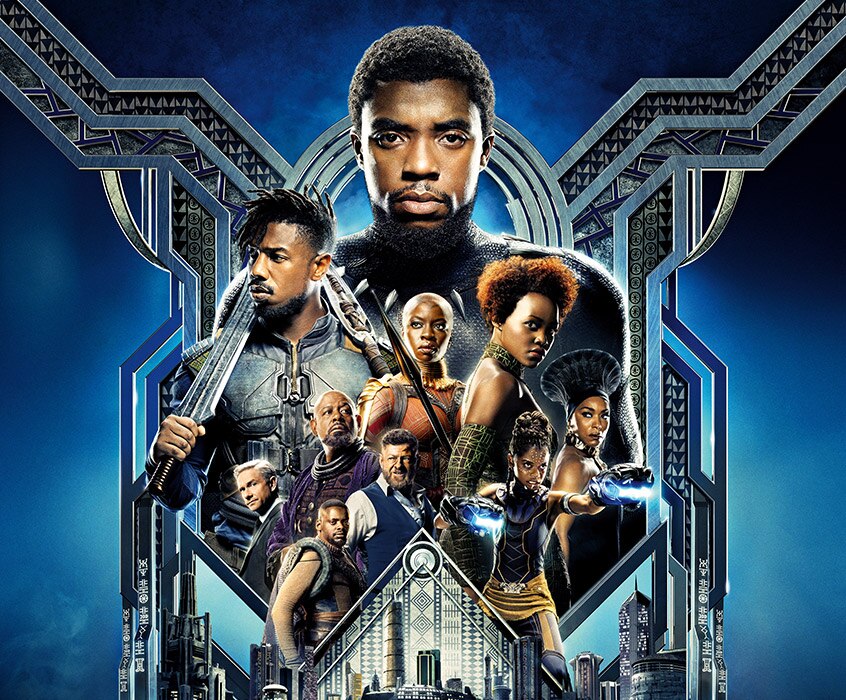The blockbuster film Black Panther changed the game for superhero films when it released in 2018; it has broken box office records worldwide and is the sixth highest-grossing superhero film in North America. Black Panther was revolutionary when it introduced the superhero to mainstream media and included many talented African actors to showcase Black culture and heritage.
Black Panther portrays Afrofuturism, which draws on fantastical themes to explore both the heritage of the African diaspora and envisions a technologically advanced, alternative future, according to an article by Hope Reese. Africa has usually been portrayed as unsophisticated in cinema; for instance, research from the University of Western Ontario showed that it’s often illustrated as backwards, savage, and primitive in media. Tomi Raji, an African-Canadian Ryerson student said, “Africa is usually portrayed as a huge jungle where animals and humans coexist in movies. I sometimes feel disappointed when I see movies where Africans have exaggerated accents, dress up in cultural outfits every single day, and are slow to understand basic things.”
This is exactly why Black Panther‘s image of Wakanda as a booming metropolis filled with vibranium-powered futuristic buildings and advanced technology is so refreshing to see. Raji added that she “liked the fact that Wakanda was presented as an affluent nation.” This level of Afro-futurism truly reimagines the future of the Black experience in Africa. “Unlike other films, Black Panther views Africa from a completely new perspective. Africa is no longer looked down upon but, in fact, a thriving country that is valued, admired and respected. I feel like the portrayal of Africa in Black Panther has made other filmmakers aware of their shortcomings when creating films about Africa,” Raji finishes.
Ever since the release of Black Panther, a new wave of Afro-futurism has been inspired in cinema. Many films portraying Afro-futurism with Black leads, such as Likarion Wainaina’s Supa Modo, Stefon Bristol’s See You Yesterday, Jordan Peele’s Horror Noire: A History of Black Horror and his blockbuster film Us, were released after Black Panther.
Black Panther also changed the game for all future superheroes. The King of Wakanda may have been one of the first successful and worldwide known Black superheros to be introduced in mainstream media, but he certainly won’t be the last. The introduction of T’challa has since created a ripple effect of many more Black superheroes, such as Phastos in Eternals, the introduction of Miles Morales as the new Spider-Man as a Black teenager, and our beloved Captain America’s spot has also been taken by African-American Sam Wilson, also known as Falcon.
Lastly, Black Panther has also resulted in the rise of many African-American actors, such as Lupita Amondi Nyong’o (who later starred in the hit film Us), Danai Gurira, Letitia Wright, and more. According to a ranking list by stacker.com, Chadwick Boseman, the actor who played Black Panther, ranks number six on “50 Black actors who made entertainment history”. It has not only given more Black actors a chance to work in cinema but has also widened their horizons, giving them a broader scope of characters and roles. In previous years of cinema, Black actors would often play minimalistic roles, characters lacking depth and power, but Marvel’s King T’challa has changed that. Never before in cinematic history was a Black man given such a powerful, leading role: that of a superhero – especially one with powerful technological war power, extreme wealth, and incredible strength (all while being the king of an entire country).
Black Panther has given future generations strong Black role models on screen, as well as new opportunities for African actors and an entirely new genre and scope of films and characters, which were previously lacking in cinema. It has, without a doubt, changed the world of cinema forever.









